Teen writer Zuni Chopra on her latest book, drawing inspiration from an illustrious family and juggling college applications and literary festivals

Zuni Chopra. Pic/Sneha Kharabe
On a rainy evening, we are seated in Zuni Chopra's Bandra home and somewhere on a whiteboard, we spot the illustration of The Reflection of a Wave, enough to revive memories of a beloved physics textbook. We're here to speak with her on her latest book, The Island of the Day Before (HarperCollins India), a collection of stories, flash fiction and poetry, where Chopra creates a world of fantasy, distinct from other young writers or greats like Neil Gaiman, whose work she admires.
ADVERTISEMENT
Her descriptive narrative featuring banshees, gnomes, and otters blends fantasy and reality effortlessly — revealing the world of a 17-year-old, and many like her, that revolves beyond textbooks or social media. As the daughter of prominent film producer Vidhu Vinod Chopra and film critic Anupama Chopra, Zuni doesn't flinch in the face of fame — writing is all she has ever known, from the age of six.
You have earlier mentioned that you think in words, not images. In this book, your narrative is extremely visual. Could you tell us about your writing process?
I try to tell the reader what I'm seeing, not in terms of images or the lighting but through direct descriptions. I begin by free-styling and when I get an idea or a good line, I jot it down. Then I construct a proper plot. But you never know what's going to happen when you sit down to write. In the book, there's a story called Blame, which was redone so many times. I went to the Iowa Young Writers workshop where I was having this critiqued by my classmates. At one point, they said, 'I think this is the big twist' and it wasn't, but I felt like I had to change everything now that they had mentioned it.

Zuni with her parents
Fiction writers often tend to create aspirational archetypes. But you tell the story like it is. What characterises your writing?
Descriptions and a different kind of fantasy. In the genre, there's always the typical protagonist who is angsty, two boys love her and now she has to make a choice. But Neil Gaiman throws all that out of the window with a button-eyed woman. He taught me that fantasy can break the boundaries of imagination.
You've dedicated this book to your grandparents. What has been the impact of your family's storytelling techniques on your own?
My parents, Anupama and Vidhu Vinod Chopra, met on my maternal grandmother's film set. They are an integral part of who I've grown to become. I wanted to dedicate this to them because I know it wouldn't mean so much to anyone as it would for them. I managed to keep it a secret until I got a copy of the book. I showed it to them and they loved it.
Subconsciously, my family's storytelling technique has impacted my own. I often get asked whether I feel pressurised because of famous parents but I've been writing since I was six. They were never overbearing. My granddad would say to my dad, 'You can be a shoemaker on the road but be the best shoemaker there.' So, there's only the pressure that you put on yourself. For me, it has always been about doing what you love and not about how it sells. And that is something I learnt from my dad. He always tells us to chase excellence and not brilliance because the latter is something that others define for you but excellence is only achieved when you push yourself to the limit.

Zuni with her grandparents
Your work busts the myth that the younger generation comes with shorter attention spans, with no fondness for reading or writing. Have young writers carved a space that is distinct from what others are telling them to do?
Even if that space exists, it is not big enough. Young writers need to come on board because the older generation has so many misconceptions about us. We have amazing stories to tell and offer a new voice on old conflicts. If we found a way to express our emotions, it would be an outlet to show the world what the younger generation is about as opposed to just selfies.
What are you working on next? Any plans to delve into non-fiction?
I'm working on getting into a university with a good writing programme. The funny thing is, I promised some of my high school teachers that I won't publish another one until I am in college. I may have broken that promise with this book, but at least it's a good book. I'm sure I'll find a lot of inspiration at university, be it fiction, film or journalism. People often say that if I want the option to study film, I could stay here and study with my dad. But I would only end up as someone's daughter. I want to break out of that. So the future is terrifying but also really exciting.
Catch up on all the latest Crime, National, International and Hatke news here. Also download the new mid-day Android and iOS apps to get latest updates
 Subscribe today by clicking the link and stay updated with the latest news!" Click here!
Subscribe today by clicking the link and stay updated with the latest news!" Click here!






